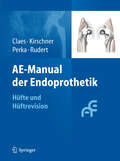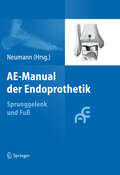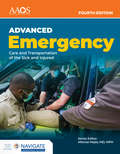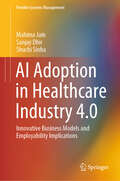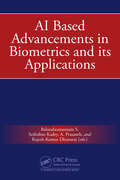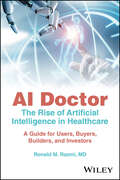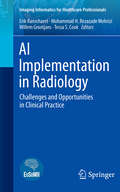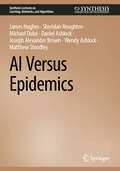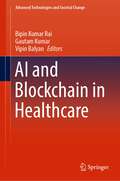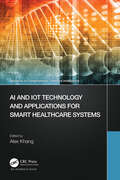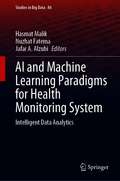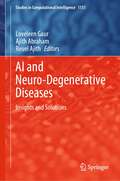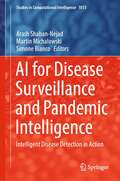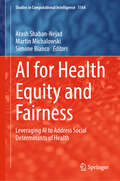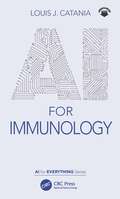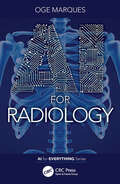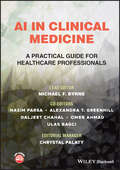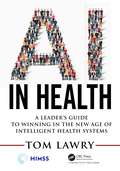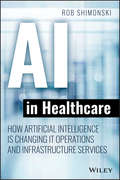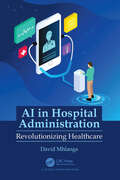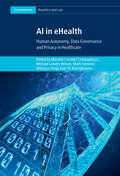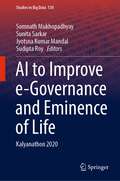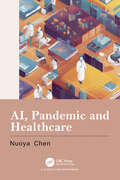- Table View
- List View
AE-Manual der Endoprothetik: Hüfte und Hüftrevision
by Lutz Claes Carsten Perka Maximilian Rudert Peter KirschnerErfahrene Autoren vermitteln in dem Band umfassendes Basis- und Expertenwissen zur Hüftendoprothetik. Neben der Entwicklung der Alloarthroplastik, Biomechanik, Design, Werkstoffen und Tribologie wird insbesondere die Operationstechnik bei primären und sekundären Coxarthrosen, hüftnahen Tumoren sowie bei der Revision gelockerter und infizierter Endoprothesen dargestellt und mit zahlreichen Abbildungen verständlich gemacht. Der Band ist Teil des Gesamtwerks "Manual der Endoprothetik", herausgegeben von der Arbeitsgemeinschaft Endoprothetik.
AE-Manual der Endoprothetik: Sprunggelenk und Fuß
by Hans Wolfram NeumannDer Band zur Endoprothetik des Sprunggelenks und des Fußes ist Teil des Gesamtwerks "Manual der Endoprothetik". Die Endoprothetik an Sprunggelenk und Fuß hat sich wegen der besonderen Biomechanik und Anatomie langsam und nur an wenigen Kliniken entwickelt. Im Mittelpunkt des Buchs stehen die Operationstechniken für die Prothesenimplantation und für die Alternativen der Osteotomie und Arthrodese. Der Band enthält eine Darstellung der unterschiedlichen Prothesenmodelle sowie viele praktische Hinweise zur postoperativen Therapie und Rehabilitation.
AEMT: Advanced Emergency Care and Transportation of the Sick and Injured Advantage Package
by AAOSThe all-new Fourth Edition of Advanced Emergency Care and Transportation of the Sick and Injured combines comprehensive content with an unparalleled suite of digital resources to fully empower AEMT students and educators.
AI Adoption in Healthcare Industry 4.0: Innovative Business Models and Employability Implications (Flexible Systems Management)
by Sanjay Dhir Shuchi Sinha Mahima JainThis book focuses on the prominent innovative business models and employability implications of artificial intelligence in the healthcare industry 4.0. To do so, it draws upon a rich base of case studies from robotics, virtual assistants, precision medicine, etc., to highlight the possibilities and implications of AI on health care. The book is useful in a variety of ways to the different stakeholders of healthcare sector. It helps medical professionals to understand the impact of the present technologies being adopted and the potential of AI-based technology. The content is of use for the policy makers as it also highlights the managerial and research implications, challenges, opportunities posed by the adoption of AI in healthcare industry 4.0. The rich case study analysis in the area of adoption of AI in healthcare helps generate insights for the academicians and researchers of this field in terms of the parallels drawn between adoptions of AI in healthcare industry 4.0 across the world. It is also useful for management students to understand the key management perspective when healthcare organizations attempt to devise strategies/policies for adoption of AI-driven technologies and processes implementation.
AI Augmented ECG Technology
by Kang-Yin Chen Tong Liu Hua-Yue TaoThis book mainly focuses on the application of AI technology in the field of ECG, and details the theoretical, practical, and evidence-based aspects of this technology. It extensively reviews the latest research reports, and discusses the application of artificial intelligence in the diagnosis and treatment of cardiovascular diseases. This book focuses on the application of artificial intelligence in the diagnosis and treatment of cardiovascular diseases, and discusses in depth its clinical application in the diagnosis and treatment of coronary heart disease, heart failure, arrhythmia, cardiac pacing, hypertension, myocardial disease, heart valve disease, electrolyte disorders, and other diseases. It not only provides an overview of medical artificial intelligence but also richly demonstrates its clinical practice, which will help cardiovascular doctors, electrocardiogram diagnostic doctors, or medical students to understand the basic theories, applications, and development direction of this field.
AI Based Advancements in Biometrics and its Applications
by Seifedine Kadry Rajesh Kumar Dhanaraj A. Prasanth S BalasubramaniamThis book delves into the history of biometrics, the different systems that have been developed to date, problems that have arisen from these systems, the necessity of AI-based biometrics systems, different AI techniques developed to date (including machine learning, deep learning, natural language processing, and pattern recognition), their potential uses and applications, security and privacy issues in AI-based Biometric systems, current trends in AI-based biometrics, and presents case studies of AI-based biometrics.
AI Doctor: The Rise of Artificial Intelligence in Healthcare - A Guide for Users, Buyers, Builders, and Investors
by Ronald M. RazmiExplores the transformative impact of artificial intelligence (AI) on the healthcare industry AI Doctor: The Rise of Artificial Intelligence in Healthcare provides a timely and authoritative overview of the current impact and future potential of AI technology in healthcare. With a reader-friendly narrative style, this comprehensive guide traces the evolution of AI in healthcare, describes methodological breakthroughs, drivers and barriers of its adoption, discusses use cases across clinical medicine, administration and operations, and life sciences, and examines the business models for the entrepreneurs, investors, and customers. Detailed yet accessible chapters help those in the business and practice of healthcare recognize the remarkable potential of AI in areas such as drug discovery and development, diagnostics, therapeutics, clinical workflows, personalized medicine, early disease prediction, population health management, and healthcare administration and operations. Throughout the text, author Ronald M. Razmi, MD offers valuable insights on harnessing AI to improve health of the world population, develop more efficient business models, accelerate long-term economic growth, and optimize healthcare budgets. Addressing the potential impact of AI on the clinical practice of medicine, the business of healthcare, and opportunities for investors, AI Doctor: The Rise of Artificial Intelligence in Healthcare: Discusses what AI is currently doing in healthcare and its direction in the next decade Examines the development and challenges for medical algorithms Identifies the applications of AI in diagnostics, therapeutics, population health, clinical workflows, administration and operations, discovery and development of new clinical paradigms and more Presents timely and relevant information on rapidly expanding generative AI technologies, such as Chat GPT Describes the analysis that needs to be made by entrepreneurs and investors as they evaluate building or investing in health AI solutions Features a wealth of relatable real-world examples that bring technical concepts to life Explains the role of AI in the development of vaccines, diagnostics, and therapeutics during the COVID-19 pandemic AI Doctor: The Rise of Artificial Intelligence in Healthcare. A Guide for Users, Buyers, Builders, and Investors is a must-read for healthcare professionals, researchers, investors, entrepreneurs, medical and nursing students, and those building or designing systems for the commercial marketplace. The book's non-technical and reader-friendly narrative style also makes it an ideal read for everyone interested in learning about how AI will improve health and healthcare in the coming decades.
AI Implementation in Radiology: Challenges and Opportunities in Clinical Practice (Imaging Informatics for Healthcare Professionals)
by Willem Grootjans Erik Ranschaert Mohammad H. Rezazade Mehrizi Tessa S. CookThis book describes change management in the context of implementing AI in medicine and radiology. Why do many medical institutions struggle to use AI in their clinical practice? What are the essential steps for and before an effective implementation of AI in radiology workflow? How can AI implementation trigger enduring improvements in the clinical process? The book shows how change management is crucial to effectively introduce AI to medicine and radiology, transform healthcare delivery and ensure a smooth transition while maximizing the benefits of AI and minimizing potential disruptions. Change management in the context of AI in medicine and radiology involves a systematic approach to identify, plan, implement, and evaluate the integration of AI technologies into healthcare systems. It engages the necessary stakeholders at the appropriate points in the process to ensure that change is implemented properly. By effectively managing the change, healthcare organizations can harness the potential of AI to enhance patient care, improve diagnosis accuracy, and optimize operational efficiency in radiology and other medical specialties. Throughout this change management process, organizations should prioritize ethical considerations, data privacy, and regulatory compliance to ensure that AI technologies are deployed responsibly and in accordance with relevant guidelines and regulations.
AI Versus Epidemics (Synthesis Lectures on Learning, Networks, and Algorithms)
by James Hughes Daniel Ashlock Joseph Alexander Brown Sheridan Houghten Michael Dubé Wendy Ashlock Matthew StoodleyThis book presents algorithms and tools that are designed to model and extract information from personal contact networks, which represent which individuals in a population are physically in contact with one another. The authors developed these tools based on research they conducted during the COVID-19 pandemic, with the goal of improving responses to epidemics in the future. The book provides methods for modelling the transmission of infection across a population. The authors explain how an epidemic model can be used to strategically distribute vaccines and minimize the spread of a virus. The book shows how evolutionary computation, graph compression, and network induction can be utilized to manage issues that arise from an epidemic.
AI and Big Data in Cardiology: A Practical Guide
by Nicolas Duchateau Andrew P. KingThis book provides a detailed technical overview of the use and applications of artificial intelligence (AI), machine learning and big data in cardiology. Recent technological advancements in these fields mean that there is significant gain to be had in applying these methodologies into day-to-day clinical practice. Chapters feature detailed technical reviews and highlight key current challenges and limitations, along with the available techniques to address them for each topic covered. Sample data sets are also included to provide hands-on tutorials for readers using Python-based Jupyter notebooks, and are based upon real-world examples to ensure the reader can develop their confidence in applying these techniques to solve everyday clinical problems.Artificial Intelligence and Big Data in Cardiology systematically describes and technically reviews the latest applications of AI and big data within cardiology. It is ideal for use by the trainee and practicing cardiologist and informatician seeking an up-to-date resource on the topic with which to aid them in developing a thorough understanding of both basic concepts and recent advances in the field.
AI and Blockchain in Healthcare (Advanced Technologies and Societal Change)
by Gautam Kumar Bipin Kumar Rai Vipin BalyanThis book presents state-of-the-art blockchain and AI advances in health care. Healthcare service is increasingly creating the scope for blockchain and AI applications to enter the biomedical and healthcare world. Today, blockchain, AI, ML, and deep learning are affecting every domain. Through its cutting-edge applications, AI and ML are helping transform the healthcare industry for the better. Blockchain is a decentralization communication platform that has the potential to decentralize the way we store data and manage information. Blockchain technology has potential to reduce the role of middleman, one of the most important regulatory actors in our society. Transactions are simultaneously secure and trustworthy due to the use of cryptographic principles. In recent years, blockchain technology has become very trendy and has penetrated different domains, mostly due to the popularity of cryptocurrencies. One field where blockchain technology has tremendous potential is health care, due to the need for a more patient-centric approach in healthcare systems to connect disparate systems and to increase the accuracy of electronic healthcare records (EHRs).
AI and IoT Technology and Applications for Smart Healthcare Systems (Advances in Computational Collective Intelligence)
by Alex KhangIn recent years, the application of Artificial Intelligence (AI) and Internet of Things (IoT) technologies in smart healthcare has been increasing. We are approaching a world where connected smart devices tell people when they need to visit a doctor because these devices will be able to detect health problems and discover symptoms of illness that may need medical care. AI-collaborative IoT technologies can help medical professionals with decision-making. These technologies can also help develop a sustainable and smart healthcare system.AI and IoT Technology and Applications for Smart Healthcare Systems helps readers understand complex scientific topics in a simple and accessible way. It introduces the world of AI-collaborative IoT physics, explaining how this technology behaves at the smallest level and how this can revolutionize healthcare. The book shows how IoT technology and AI can work together to make computers more powerful and capable of solving complex problems in the healthcare sector. Exploring the effect of AI-collaborative technology on IoT technologies, the book discusses how IoT can benefit from AI algorithms to enable machines to learn, make decisions, and process information more efficiently. Because smart machines create more perceptive devices and systems, the application of this technology raises important ethical questions about privacy, security, and the responsible development of healthcare IoT technology, which this book covers. The book also provides insight into the potential applications of these technologies not only in the healthcare industry but also in related fields, such as smart transportation, smart manufacturing, and smart cities.
AI and Machine Learning Paradigms for Health Monitoring System: Intelligent Data Analytics (Studies in Big Data #86)
by Jafar A. Alzubi Hasmat Malik Nuzhat FatemaThis book embodies principles and applications of advanced soft computing approaches in engineering, healthcare and allied domains directed toward the researchers aspiring to learn and apply intelligent data analytics techniques. The first part covers AI, machine learning and data analytics tools and techniques and their applications to the class of several hospital and health real-life problems. In the later part, the applications of AI, ML and data analytics shall be covered over the wide variety of applications in hospital, health, engineering and/or applied sciences such as the clinical services, medical image analysis, management support, quality analysis, bioinformatics, device analysis and operations. The book presents knowledge of experts in the form of chapters with the objective to introduce the theme of intelligent data analytics and discusses associated theoretical applications. At last, it presents simulation codes for the problems included in the book for better understanding for beginners.
AI and Neuro-Degenerative Diseases: Insights and Solutions (Studies in Computational Intelligence #1131)
by Ajith Abraham Loveleen Gaur Reuel AjithThis book explores the current state of healthcare practice and provides a roadmap for harnessing artificial intelligence (AI) and other modern cognitive technologies for neurogenerative diseases. The main goal of this book is to look at how these techniques can be used to classify patients with neurodegenerative diseases by extracting data from multiple modalities. It demonstrates that the growing development of computer-aided diagnosis systems has a lot of potential to help with the diagnostic process. It offers an analysis of the prospective and perils in implementing such state of the art.Progressive brain disorders with a high prevalence in the general population include Parkinson's disease, Alzheimer's disease and other types of dementia, Huntington's disease, and motor neuron disease. Worldwide, it is estimated that 33 million people have Alzheimer's disease, and 10 million people have Parkinson's disease. The global health economy is significantly impacted by these disorders, which affect both the patient and the caregivers. Various diagnostic techniques are used for differential diagnoses, such as brain imaging, EEG analysis, molecular analysis, and cognitive, psychological, and physical examination. The book aims to develop effective treatments, enhance patient quality of life, and extend life expectancy. It focuses on novel artificial intelligence approaches to clarify the pathogenesis of neurodegenerative disorders and provide early diagnosis.The authors compile recent developments based on machine learning and deep learning techniques to diagnose neurodegenerative diseases using imaging, genetic, and clinical data. The authors support initiatives and methods that aim to improve the application of algorithms in diagnostic practice.
AI for Disease Surveillance and Pandemic Intelligence: Intelligent Disease Detection in Action (Studies in Computational Intelligence #1013)
by Simone Bianco Arash Shaban-Nejad Martin MichalowskiThis book aims to highlight the latest achievements in the use of artificial intelligence for digital disease surveillance, pandemic intelligence, as well as public and clinical health surveillance. The edited book contains selected papers presented at the 2021 Health Intelligence workshop, co-located with the Association for the Advancement of Artificial Intelligence (AAAI) annual conference, and presents an overview of the issues, challenges, and potentials in the field, along with new research results. While disease surveillance has always been a crucial process, the recent global health crisis caused by COVID-19 has once again highlighted our dependence on intelligent surveillance infrastructures that provide support for making sound and timely decisions. This book provides information for researchers, students, industry professionals, and public health agencies interested in the applications of AI in population health and personalized medicine.
AI for Health Equity and Fairness: Leveraging AI to Address Social Determinants of Health (Studies in Computational Intelligence #1164)
by Simone Bianco Arash Shaban-Nejad Martin MichalowskiThis book aims to highlight the latest achievements in the use of AI for improving Health Equity and Fairness. The edited volume contains selected papers presented at the 2024 Health Intelligence workshop, co-located with the Thirty-Eight Association for the Advancement of Artificial Intelligence (AAAI) conference, and presents an overview of the issues, challenges, and potentials in the field, along with new research results. This book provides information for researchers, students, industry professionals, clinicians, and public health agencies interested in the applications of AI in medicine and public health.
AI for Immunology (AI for Everything)
by Louis J. CataniaThe bioscience of immunology has given us a better understanding of human health and disease. Artificial intelligence (AI) has elevated that understanding and its applications in immunology to new levels. Together, AI for immunology is an advancing horizon in health care, disease diagnosis, and prevention. From the simple cold to the most advanced autoimmune disorders and now pandemics, AI for immunology is unlocking the causes and cures. Key features: A highly accessible and wide-ranging short introduction to AI for immunology Includes a chapter on COVID-19 and pandemics Includes scientific and clinical considerations, as well as immune and autoimmune diseases
AI for Radiology (AI for Everything)
by Oge MarquesArtificial intelligence (AI) has revolutionized many areas of medicine and is increasingly being embraced. This book focuses on the integral role of AI in radiology, shedding light on how this technology can enhance patient care and streamline professional workflows. This book reviews, explains, and contextualizes some of the most current, practical, and relevant developments in artificial intelligence and deep learning in radiology and medical image analysis. AI for Radiology presents a balanced viewpoint of the impact of AI in these fields, underscoring that AI technologies are not intended to replace radiologists but rather to augment their capabilities, freeing professionals to focus on more complex cases. This book guides readers from the basic principles of AI to their practical applications in radiology, moving from the role of data in AI to the ethical and regulatory considerations of using AI in radiology and concluding with a selection of resources for further exploration. This book has been crafted with a diverse readership in mind. It is a valuable asset for medical professionals eager to stay up to date with AI developments, computer scientists curious about AI’s clinical applications, and anyone interested in the intersection of healthcare and technology.
AI in Clinical Medicine: A Practical Guide for Healthcare Professionals
by Ulas Bagci Michael F. Byrne Nasim Parsa Alexandra T. Greenhill Daljeet Chahal Omer AhmadAI IN CLINICAL MEDICINE An essential overview of the application of artificial intelligence in clinical medicine AI in Clinical Medicine: A Practical Guide for Healthcare Professionals is the definitive reference book for the emerging and exciting use of AI throughout clinical medicine. AI in Clinical Medicine: A Practical Guide for Healthcare Professionals is divided into four sections. Section 1 provides readers with the basic vocabulary that they require, a framework for AI, and highlights the importance of robust AI training for physicians. Section 2 reviews foundational ideas and concepts, including the history of AI. Section 3 explores how AI is applied to specific disciplines. Section 4 describes emerging trends, and applications of AI in medicine in the future. Readers will find that this book: Describes where AI is currently being used to change practice, and provides successful cases of AI approaches in specific medical domains. Dives into the actual implementation of AI in the healthcare setting, and addresses reimbursement, workforce, and many other practical issues. Addresses some of the unique challenges associated with AI in clinical medicine including ethical issues, as well as regulatory and privacy concerns. Includes bulleted lists of learning objectives, key insights, clinical vignettes, brief examples of where AI is successfully deployed, and examples of potential problematic uses of AI and possible risks. From radiology, to pathology, dermatology, endoscopy, robotics, virtual reality, and more, AI in Clinical Medicine: A Practical Guide for Healthcare Professionals explores all recent state-of-the-art developments in the field. It is an essential resource for a general medical audience across all disciplines, from students to clinicians, academics to policy makers.
AI in Health: A Leader’s Guide to Winning in the New Age of Intelligent Health Systems (HIMSS Book Series)
by Tom LawryWe are in the early stages of the next big platform shift in healthcare computing. Fueled by Artificial Intelligence (AI) and the Cloud, this shift is already transforming the way health and medical services are provided. As the industry transitions from static digital repositories to intelligent systems, there will be winners and losers in the race to innovate and automate the provision of services. Critical to success will be the role leaders play in shaping the use of AI to be less "artificial" and more "intelligent" in support of improving processes to deliver care and keep people healthy and productive across all care settings. This book defines key technical, process, people, and ethical issues that need to be understood and addressed in successfully planning and executing an enterprise-wide AI plan. It provides clinical and business leaders with a framework for moving organizations from the aspiration to execution of intelligent systems to improve clinical, operational, and financial performance.
AI in Healthcare: How Artificial Intelligence Is Changing IT Operations and Infrastructure Services
by Robert ShimonskiThe best source for cutting-edge insights into AI in healthcare operations AI in Healthcare: How Artificial Intelligence Is Changing IT Operations and Infrastructure Services collects, organizes and provides the latest, most up-to-date research on the emerging technology of artificial intelligence as it is applied to healthcare operations. Written by a world-leading technology executive specializing in healthcare IT, this book provides concrete examples and practical advice on how to deploy artificial intelligence solutions in your healthcare environment. AI in Healthcare reveals to readers how they can take advantage of connecting real-time event correlation and response automation to minimize IT disruptions in critical healthcare IT functions. This book provides in-depth coverage of all the most important and central topics in the healthcare applications of artificial intelligence, including: Healthcare IT AI Clinical Operations AI Operational Infrastructure Project Planning Metrics, Reporting, and Service Performance AIOps in Automation AIOps Cloud Operations Future of AI Written in an accessible and straightforward style, this book will be invaluable to IT managers, administrators, and engineers in healthcare settings, as well as anyone with an interest or stake in healthcare technology.
AI in Hospital Administration: Revolutionizing Healthcare
by David MhlangaAI in Hospital Administration: Revolutionizing Healthcare is a groundbreaking book that explores the transformative potential of artificial intelligence (AI) in hospital administration and its impact on revolutionizing healthcare. This book draws on existing academic literature and interdisciplinary research to provide a comprehensive overview of cutting-edge AI technologies and their applications in hospital administration. The book begins by highlighting the basics of AI. It moves to the challenges hospital administrators face, such as long wait times, inefficient scheduling, inaccurate forecasting, and suboptimal resource allocation. It emphasizes the need for effective management and decision-making strategies to optimize patient outcomes while ensuring efficient resource utilization. While AI has seen significant advancements in areas like medical imaging and clinical decision support systems, its role in hospital administration remains relatively understudied. This book aims to fill this gap by delving into the complexities of managing patient flow, optimizing resource allocation, ensuring effective staff scheduling, and implementing data-driven decision-making processes. It explores various AI-powered solutions, including machine learning, natural language processing, and predictive analytics, and their potential to alleviate these challenges. It also covers ethical considerations and potential barriers to AI adoption in healthcare, such as privacy concerns, data security, and the human-machine interface. The book includes real-world case studies and examples of successful AI implementations in hospital administration to provide practical insights. Doing so equips healthcare professionals, administrators, policymakers, and researchers with the knowledge and tools to leverage AI effectively, foster innovation, and drive positive change in healthcare organizations. In short, AI in Hospital Administration: Revolutionizing Healthcare addresses the gap in academic literature surrounding the role of AI in hospital administration. It comprehensively understands this domain's challenges, limitations, and opportunities, stimulating further research and promoting informed decision-making. The book envisions a future where AI plays a central role in transforming healthcare administration for the better.
AI in eHealth: Human Autonomy, Data Governance and Privacy in Healthcare (Cambridge Bioethics and Law)
by Mark Fenwick Marcelo Corrales Compagnucci Michael Lowery Wilson Nikolaus Forǵ Till BärnighausenThe emergence of digital platforms and the new application economy are transforming healthcare and creating new opportunities and risks for all stakeholders in the medical ecosystem. Many of these developments rely heavily on data and AI algorithms to prevent, diagnose, treat, and monitor diseases and other health conditions. A broad range of medical, ethical and legal knowledge is now required to navigate this highly complex and fast-changing space. This collection brings together scholars from medicine and law, but also ethics, management, philosophy, and computer science, to examine current and future technological, policy and regulatory issues. In particular, the book addresses the challenge of integrating data protection and privacy concerns into the design of emerging healthcare products and services. With a number of comparative case studies, the book offers a high-level, global, and interdisciplinary perspective on the normative and policy dilemmas raised by the proliferation of information technologies in a healthcare context.
AI to Improve e-Governance and Eminence of Life: Kalyanathon 2020 (Studies in Big Data #130)
by Jyotsna Kumar Mandal Somnath Mukhopadhyay Sudipta Roy Sunita SarkarThe volume presents research works on developing Artificial Intelligence based algorithms and methodologies for making social good that too to a notable one. The book discusses latest findings on efficient technological solutions of e-governance and other areas of life from the leading researchers in the field. The prime focus is on solving socio-economic technical problems using state-of-the-art research findings like fuzzy computing, evolutionary and hybrid frameworks, neuro computing, etc., along with other AI based computation platforms. The topics covered include solution frameworks using Artificial Intelligence based models in application areas like agriculture and rural development, road accident, travel and tourism, solid waste management, rural medical care, crowd sourced election monitoring system, ragging, rape and other abuses, cyber criminals and cyber bullying, disaster management, social good, etc. The book offers a valuable resource for all undergraduate, postgraduate students and researchers interested in exploring solution frameworks for social good problems using artificial intelligence.
AI, Pandemic and Healthcare
by Nuoya ChenThe demand for telehealth solutions has been growing exponentially after the Covid-19 pandemic. Hospitals remain understaffed, which leads to staff burnouts and unsatisfactory patient experience. They also find it difficult to use AI to reduce the workload for doctors and nurses. Doctors barely use data collected from wearables and home-use medical devices to make diagnosis. As generative AI advances, traditional medical device manufacturers are exploring with open innovation to transform into a software-based business model facing competition from large tech companies and startups. This book shares the perspectives from different stakeholders around the challenges of the use of AI in healthcare.
